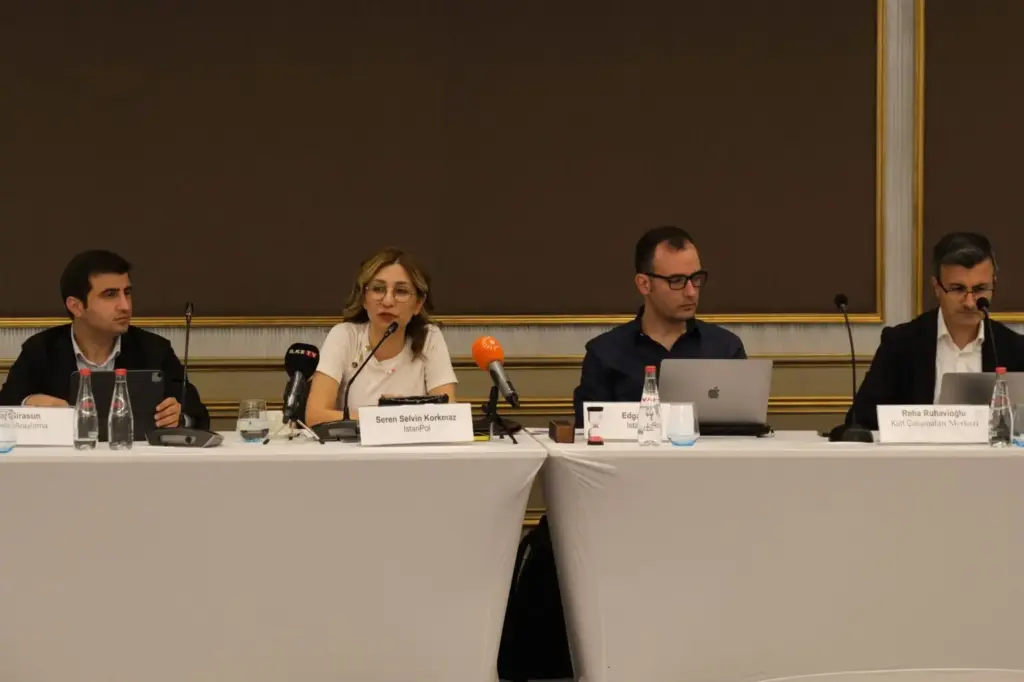A new joint study by Rawest Research and IstanPol finds that 64% of respondents support Turkey’s renewed Kurdish peace process. Yet despite this clear majority, public confidence in the process’s success remains strikingly low, reflecting broader political mistrust.

Photo: Medyascope
A major nationwide study exploring how Turkish society understands and responds to the Kurdish question was published last week by Rawest Research in partnership with IstanPol. Titled “A New Era in the Kurdish Question: Perceptions, Opinions, and Attitudes in Turkish Society,” the research surveyed 2,010 participants from across the country, offering one of the most detailed snapshots to date of public opinion on key political developments.
The study examines a series of pivotal events that have reshaped Turkish politics in recent months. These include the arrest of Istanbul Mayor Ekrem İmamoğlu and the intensifying legal pressure on the main opposition party, the CHP. Most significantly, the research focuses on public perceptions of the renewed Kurdish peace process, which began on October 1, 2024, under the initiative of Nationalist Movement Party (MHP) leader Devlet Bahçeli. The process gained further momentum when the Kurdistan Workers’ Party (PKK) announced its decision to disband. Together, these developments have sparked intense national debate, raising hopes for political de-escalation while also highlighting enduring divisions within Turkish society.
İmamoğlu’s Arrest Increases Polarization
The events of 19 March 2025, including the annulment of İmamoğlu’s diploma and his subsequent arrest, along with investigations targeting CHP municipalities, have significantly reshaped the political landscape in Turkey. The study reveals that this period has deepened political polarization. Fewer than one-third of respondents see the annulment and arrest as justified, while 46 percent believe İmamoğlu was targeted to prevent him from winning an election. Around two-thirds of ruling alliance voters support the operation, whereas voters from the CHP and pro-Kurdish DEM Party overwhelmingly oppose it.
Kurdish Question: An Issue of Equality
The research confirms that the Kurdish question is widely recognized across society. While 41 percent of Turkish respondents acknowledge the existence of the issue, that figure rises to 60 percent among Kurdish respondents. Additionally, 29 percent of participants believe that Kurds and Turks are not treated equally by the state, a view held by nearly half of Kurdish respondents.
One of the most notable findings is the growing public support for the peace process that began in October 2024 with the initiative of Devlet Bahçeli and the subsequent decision by the PKK to disband. Public backing has risen from around 45 percent to 64 percent overall. Among Kurdish respondents, support increased to over 80 percent, while support among Turkish and other groups reached around 60 percent.
DEM Party voters express the strongest support. Half of CHP voters support the process, and the other half largely do not oppose it. However, 34 percent of CHP voters say they do not support the initiative. One in four MHP voters and one in six AKP voters also report a lack of support. Despite the rise in overall support, fewer than 42 percent of respondents believe the process is proceeding successfully. Only among AKP voters does confidence in its success exceed 50 percent. Among all other voter groups, it remains lower.
Mixed Feelings on Government Motivation
Nearly 60 percent of respondents believe the process is improving both national security and relations between Kurds and Turks. Many also believe it is politically beneficial for the AKP and DEM Party. However, public views on the government’s motivations are mixed. A significant portion of the population believes the process is aimed at enabling President Erdoğan to win another term in office. An equally widespread belief is that the process seeks to promote Kurdish-Turkish equality. Meanwhile, 30 percent believe it is designed to block Kurdish political gains in the Middle East, although 49 percent reject this idea. Belief in the possibility of PKK disarmament is divided. Two-thirds of Kurdish respondents believe the PKK will disarm, while one in four disagree. Among Turks, 42 percent expect the group to lay down arms.
Further details can be accessed in Turkish here.
The research recieved support from the Friedrich-Ebert-Stiftung Turkey Office.

